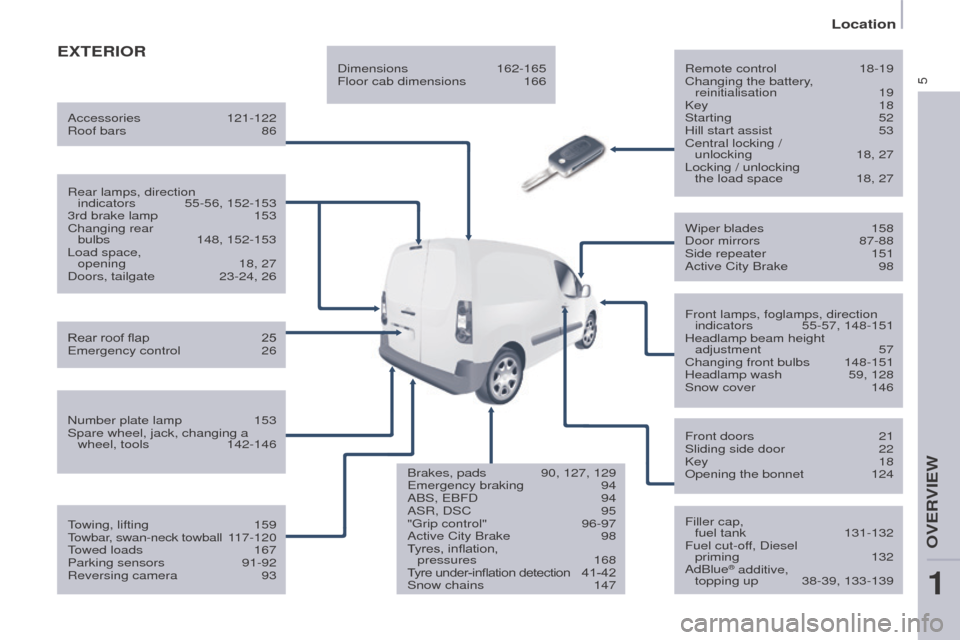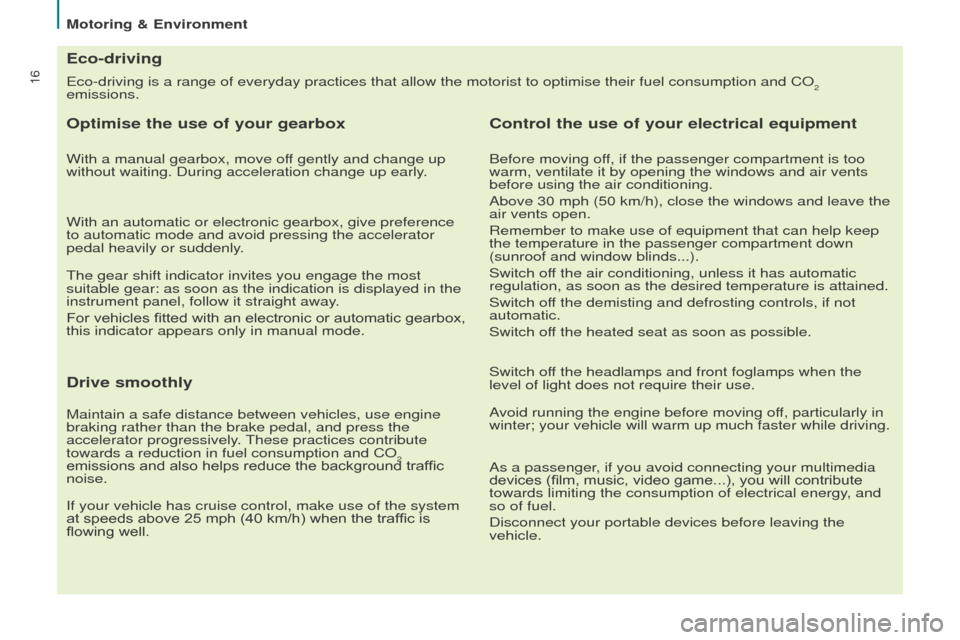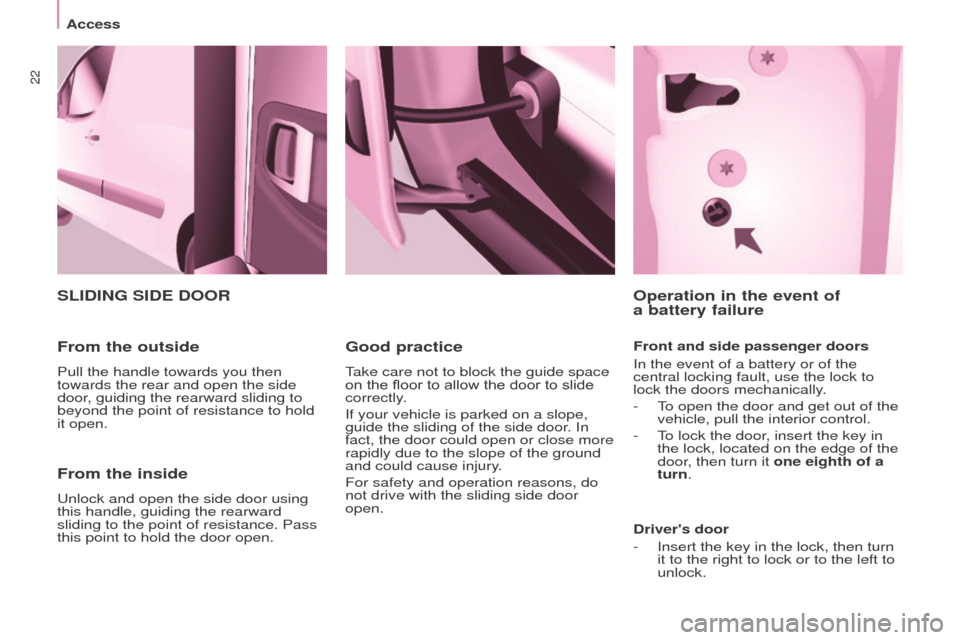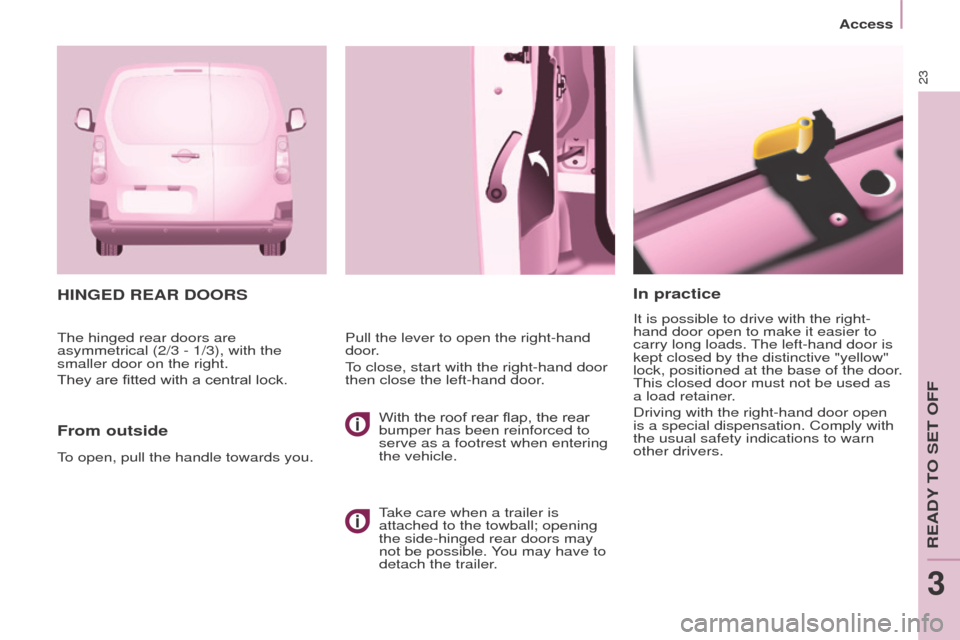Page 5 of 292
3
Partner-2-VU_en_Chap00a_Sommaire_ed01-2015
corresponds to
a left hand drive
vehicle.corresponds to a
right hand drive
vehicle.
TECHNOLOGY on
BOARD
ACCESSORIES
CHECKS QUICK HELP
7-inch touch screen 169
P EUGEOT Connect
Sound (RD5)
231
T
owing a trailer
1
17
Towbar with detachable swan neck towball
1
19
Other accessories
121
Opening the bonnet
124
Petrol engine
125
Diesel engine
126
Levels
127
Checks
129
Fuel
131
Fuel cut-off
132
Diesel priming pump
132
BlueHDi
and AdBlue
®
additive
133 Battery
140
Changing a wheel
142
Removable snow
screen 146
Snow chains
147
Changing a bulb
148 a fuse
154 a wiper blade
158
Being towed
159
Precautions
160
TECHNICAL
D ATA
Dimensions 162
Engines 167
Weights
167
Identification markings
168The "T
echnology on board"
section presents the new
audio/navigation systems.
P EUGEOT
Connect is the
name given to all of the
new equipment of the radio/
navigation range.
117-122
123-139 140-160
162-168 169-249
6.
7. 8.
9. 10.
Contents
CONTENTS
Page 7 of 292

5
Partner-2-VU_en_Chap01_vue-ensemble_ed01-2015
ExTERIORRemote control 18-19
Changing the battery ,
reinitialisation
19
Key
18
Starting
52
Hill start assist
53
Central locking /
unlocking
18, 27
Locking / unlocking
the load space
18, 27
Filler cap,
fuel tank
131-132
Fuel cut-of
f, Diesel
priming
132
AdBlue
® additive,
topping up 38-39, 133-139
Wiper blades
158
Door mirrors
87-88
Side repeater
151
Active City Brake
98
Front lamps, foglamps, direction indicators
55-57, 148-151
Headlamp beam height adjustment
57
Changing front bulbs
148-151
Headlamp wash
59, 128
Snow cover
146
Front doors
21
Sliding side door
22
Key
18
Opening the bonnet
124
T
owing, lifting
159
T
owbar, swan-neck towball
1
17-120
Towed loads
167
Parking sensors
91-92
Reversing camera
93
Number plate lamp
153
Spare wheel, jack, changing a wheel, tools
142-146
Rear lamps, direction
indicators
55-56, 152-153
3rd brake lamp
153
Changing rear
bulbs
148, 152-153
Load space,
opening
18, 27
Doors, tailgate
23-24, 26
Accessories
121-122
Roof bars
86
Rear roof flap
25
Emergency control
26 Dimensions
162-165
Floor cab dimensions
166
Brakes, pads
90, 127, 129
Emergency braking
94
ABS, EBFD
94
ASR, DSC
95
"Grip control"
96-97
Active City Brake
98
T
yres, inflation,
pressures
168
T
yre under-inflation detection
4
1-42
Snow chains
147
1
OVERVIEW
Location
Page 8 of 292
6
Partner-2-VU_en_Chap01_vue-ensemble_ed01-2015
Rear view mirror 88
Front courtesy lamp 81
Changing courtesy lamp
bulbs
151
Spare wheel, jack,
changing a wheel,
tools
142-146
Snow chains
147 Front, lateral airbags
104-107
Passenger's airbag
deactivation
107, 1
10
Battery, recharging, starting
140
Opening the bonnet
124
T
owing, towbar, coachbuilders, floor cab fuses
156
Front seats, adjustments,
head restraint
74-75
Multi-Flex bench seat
76-77
Seat, bench
configurations
78
Seat belts
102-103
INTERIOR
Rear courtesy lamp 81
Changing courtesy lamp
bulbs
151
Load space
84-86
-
12 volt socket,
-
stowing rings,
-
trim,
-
load retainer
,
-
ladder separation or partition,
-
removable flap. Child seats
108-1
16
Parking brake, handbrake
90
Accessories
121-122
Location
Page 9 of 292
7
Partner-2-VU_en_Chap01_vue-ensemble_ed01-2015
INTERIOR
Rear view mirror 88
Front courtesy lamp 81
Changing courtesy
lamp bulbs
151
Spare wheel,
jack, changing a wheel,
tools
142-146
Snow chains
147 Front, lateral airbags
104-107
Passenger's airbag
deactivation
107, 1
10
Battery, recharging, starting
140
Child seats
108-1
16
Parking brake, handbrake
90
Front seats, adjustments,
head restraint
74-75
Multi-Flex bench seat
76-77
Seat, bench
configurations
78
Seat belts
102-103 Accessories
121-122
Rear courtesy lamp
81
Changing courtesy lamp
bulbs
151
Load space
84-86
-
12 volt socket,
-
stowing rings,
-
trim,
-
load retainer
,
-
ladder separation or partition,
-
removable flap.
Opening the bonnet
124
T
owing, towbar, coachbuilders, floor cab fuses
156
1
OVERVIEW
Location
Page 18 of 292

16Eco-driving is a range of everyday practices that allow the motorist to \
optimise their fuel consumption and CO2
emissions.
Eco-driving
Optimise the use of your gearbox
With a manual gearbox, move off gently and change up
without waiting. During acceleration change up early.
With an automatic or electronic gearbox, give preference
to automatic mode and avoid pressing the accelerator
pedal heavily or suddenly.
The gear shift indicator invites you engage the most
suitable gear: as soon as the indication is displayed in the
instrument panel, follow it straight away.
For vehicles fitted with an electronic or automatic gearbox,
this indicator appears only in manual mode.
Drive smoothly
Maintain a safe distance between vehicles, use engine
braking rather than the brake pedal, and press the
accelerator progressively. These practices contribute
towards a reduction in fuel consumption and CO
2
emissions and also helps reduce the background traffic
noise.
If your vehicle has cruise control, make use of the system
at speeds above 25 mph (40 km/h) when the traffic is
flowing well.
Control the use of your electrical equipment
Before moving off, if the passenger compartment is too
warm, ventilate it by opening the windows and air vents
before using the air conditioning.
Above 30 mph (50 km/h), close the windows and leave the
air vents open.
Remember to make use of equipment that can help keep
the temperature in the passenger compartment down
(sunroof and window blinds...).
Switch off the air conditioning, unless it has automatic
regulation, as soon as the desired temperature is attained.
Switch off the demisting and defrosting controls, if not
automatic.
Switch off the heated seat as soon as possible.
Switch off the headlamps and front foglamps when the
level of light does not require their use.
Avoid running the engine before moving off, particularly in
winter; your vehicle will warm up much faster while driving.
As a passenger, if you avoid connecting your multimedia
devices (film, music, video game...), you will contribute
towards limiting the consumption of electrical energy, and
so of fuel.
Disconnect your portable devices before leaving the
vehicle.
Motoring & Environment
Page 24 of 292

22
Partner-2-VU_en_Chap03_Pret-a-partir_ed01-2015
From the inside
Unlock and open the side door using
this handle, guiding the rearward
sliding to the point of resistance. Pass
this point to hold the door open.
Good practice
Take care not to block the guide space
on the floor to allow the door to slide
correctly.
If your vehicle is parked on a slope,
guide the sliding of the side door. In
fact, the door could open or close more
rapidly due to the slope of the ground
and could cause injury.
For safety and operation reasons, do
not drive with the sliding side door
open.
SLIDING SIDE DOOR
From the outside
Pull the handle towards you then
towards the rear and open the side
door, guiding the rearward sliding to
beyond the point of resistance to hold
it open.
Operation in the event of
a battery failure
Front and side passenger doors
In the event of a battery or of the
central locking fault, use the lock to
lock the doors mechanically.
-
T
o open the door and get out of the
vehicle, pull the interior control.
-
T
o lock the door, insert the key in
the lock, located on the edge of the
door, then turn it one eighth of a
turn.
Driver's door
-
Insert the key in the lock, then turn
it to the right to lock or to the left to
unlock.
Access
Page 25 of 292

23
Partner-2-VU_en_Chap03_Pret-a-partir_ed01-2015
In practice
It is possible to drive with the right-
hand door open to make it easier to
carry long loads. The left-hand door is
kept closed by the distinctive "yellow"
lock, positioned at the base of the door.
This closed door must not be used as
a load retainer.
Driving with the right-hand door open
is a special dispensation. Comply with
the usual safety indications to warn
other drivers.
HINGED REAR DOORS
From outside
Pull the lever to open the right-hand
door.
To close, start with the right-hand door
then close the left-hand door.
To open, pull the handle towards you. The hinged rear doors are
asymmetrical (2/3 - 1/3), with the
smaller door on the right.
They are fitted with a central lock. With the roof rear flap, the rear
bumper has been reinforced to
serve as a footrest when entering
the vehicle.
Take care when a trailer is
attached to the towball; opening
the side-hinged rear doors may
not be possible. You may have to
detach the trailer.
Access
READY TO SET OFF
3
Page 26 of 292
24
Partner-2-VU_en_Chap03_Pret-a-partir_ed01-2015
From inside
When present on the vehicle, pulling
this handle towards you opens the left-
hand door.
Opening to approximately 180°
A check strap system permits
extension of the opening from
approximately 90° to approximately
180°.
Pull the yellow control when the door
is open.
The check strap will engage again
automatically on closing.When parked with the
rear doors open to 90°,
the doors mask the rear
lamps. To signal your
position to other road
users driving in the same
direction who may not
have seen your vehicle,
use a warning triangle
or other device required
by the legislation in your
country.
Access